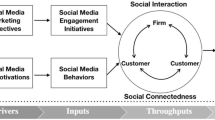Abstract
The contemporary social web differs from its predecessors in the early 1990s especially in one respect: Today, quantifiable valuation practices occupy a core position–most prominently depicted by platform activities such as Facebook’s like button, Twitter’s follower count or eBay’s feedback ratings, each of them attributing certain kinds of values to persons, documents, places and alike. Thus, the other typically appears with a certain value, i. e. with a potential function rendering otherness to a certain degree unproblematic for exchange. On the one hand, these practices and its symbols transcend situations and relationships–similar to the function of money according to German sociologist Georg Simmel–establishing a media system that mediates between strangers who may remain strangers. On the other hand, their communitizing functions appear to be evident as well. I argue this twofold function points to the strength of these valuation practices and their symbols: Platform activities are not simply media for a certain kind of exchange, they become media for certain forms of exchange. This, however, does not mean they might be conceptualized as a sort of empty signifiers that can be filled with any kind of meaning or function. On the contrary, it renders their role for sociality constitutional (at least online): When becoming ›social media‹ in terms of facilitating and fostering sociality, they enact a definitional agency and a specific kind of rationality for each situation.
Similar content being viewed by others
Literatur
Bickenbach, Matthias/ Maye, Harun (1997): »Zwischen fest und flüssig–Das Medium Internet und die Entdeckung seiner Metaphern«. In: Lorenz Gräf/ Markus Krajewski (Hg.): Soziologie des Internet. Handeln im elektronischen Web-Werk. Frankfurt a. M./New York, S. 80–98.
Bickenbach, Matthias/ Maye, Harun (2009): Metapher Internet. Literarische Bildung und Surfen. Berlin.
Change.org (2013): »An den Landtag NRW: Retten Sie die Sonn- und Feiertagstradition des Edeka ›Schuh‹ in Siegen«. http://www.change.org/p/an-den-landtag-nrw-retten-sie-die-sonn-und-feiertagstradition-des-edeka-schuh-in-siegen (22.11.2014).
Cohen, Albert K. (2005): »A general theory of subcultures« [1955]. In: Ken Gelder (Hg.): The Subcultures Reader. 2. Aufl. New York, S. 50–59.
Coleman, Gabriella E. (2012): »Phreaks, hackers and trolls. The politics of transgression and spectacle«. In: Michael Mandiberg (Hg.): The Social Media Reader. New York/London, 5. 99–119.
Därmann, Iris (2010): Theorien der Gabe. Hamburg.
Detering, Sebastian (2008): »Virtual communities«. In: Ronald Hitzler/ Anne Honer/ Michaela Pfadenhauer (Hg.): Posttraditionale Gemeinschaften. Theoretische und ethnografische Erkundungen. Wiesbaden, S. 115–131.
Gerlitz, Carolin/ Helmond, Anne (2013): »The like economy: Social buttons and the data-inten sive web«. New Media & Society 15, 8, S. 1348–1365.
Graeber, David (2012): Schulden. Die ersten 5000 Jahre [2011]. 4. Aufl. Übers. von Ursel Schäfer, Hans Freundl und Stephan Gebauer. Stuttgart.
Granovetter, Mark S. (1973): »The strength of weak ties«. In: American Journal of Sociology, 78, 6, S. 1360–1380.
Harbsmeier, Michael (1996): »Spontaneous ethnographies. Towards a social history of travelers’ tales«. In: Borut Brumen/ Zamgo Smitek (Hg.): MESS. Mediterranean Ethnological Summer School. Ljubljana, S. 23–39.
Heise.de (2013): »Merkel: ›Das Internet ist für uns alle Neuland‹«. http://www.heise.de/newsticker/meldung/Merkel-Das-Internet-ist-fuer-uns-alle-Neuland-1892701.html (25.10.2014).
Hirschauer, Stefan (1999): »Die Praxis der Fremdheit und die Minimierung von Anwesenheit. Eine Fahrstuhlfahrt«. In: Soziale Welt 50, S. 221–246.
Keating, Peter/ Cambrosio, Albert (2003): Biomedical Platforms. Realigning the Normal and the Pathological in Late-Twentieth-Century Medicine. Cambridge, Mass.
Kollock, Peter (1999): »The economies of online cooperation: gifts and public goods in cyberspace«. In: Marc Smith/ Peter Kollock (Hg.): Communities in Cyberspace. London, S. 220–239.
Luhmann, Niklas (1987): Soziale Systeme. Grundriß einer allgemeinen Theorie [1984]. Frankfurt a. M.
Mauss, Marcel (1991): Die Gabe. Form und Funktion des Austauschs in archaischen Gesellschaften. Übers. von Eva Moldenhauer. Frankfurt a. M.
Mayer, Jonathan/ Mitchell, John (2012): »Third-party web tracking: policy and technology«. In: SP’ 12 Proceedings of the 2012 IEEE Symposium on Security and Privacy, S. 413–427.
Paßmann, Johannes/ Boeschoten, Thomas/ Schäfer, Mirko Tobias (2013): »The gift of the gab. Retweet cartels and gift economies on Twitter«. In: Axel Bruns et al. (Hg.): Twitter and Society. New York, S. 331–344.
Paßmann, Johannes/ Gerlitz, Carolin (2014): »›Good‹ platform-political reasons for ›bad‹ platform-data. Zur sozio-technischen Geschichte der Plattformaktivitäten Fav, Retweet und Like«. In: Mediale Kontrolle unter Beobachtung 3, 1, S. 40 (Sonderausgabe Datenkritik. Hg. Sebastian Gießmann/Markus Burkhardt), http://www.medialekontrolle.de/wp-content/uploads/2014/09/Passmann-Johannes-Gerlitz-Carolin-2014-03-01.pdf (25.10.2014).
Paßmann Johannes (2014a): »Baumhaus und Hausrecht. Netzneutralität zwischen historischem Ideal und technisch-ökonomischer Wirklichkeit«. In: Peter Kemper/ Alf Mentzer/ Julika Tillmanns (Hg.): »Wir nennen es Wirklichkeit«. Denkanstöße zur Netzkultur. Stuttgart, S. 235–253.
Paßmann Johannes (2014b): »From mind to document and back again. Zur Reflexivität von Social-Media-Daten«. In: Ramón Reichert (Hg.): Big Data. Analysen zum digitalen Wandel von Wissen, Macht und Ökonomie. Bielefeld, S. 259–285.
Paßmann Johannes (2014c): »Der Twitterer als Phantom. Zu Autorschafts- und Personalitäts-konstruktionen im Social Web«. In: TUMULT. Vierteljahresschrift für Verkehrswissenschaft (Herbst 2014), S. 91–96.
Reichert, Ramón (2008): Amateure im Netz. Selbstmanagement und Wissenstechnik im Web 2.0. Bielefeld.
Rheingold, Howard (1994): Virtuelle Gemeinschaft. Soziale Beziehungen im Zeitalter des Computers. Übers. von Dagmar Schulz und Dieter Strehle. Bonn u. a.
Simmel, Georg (2011): Philosophie des Geldes [1900]. Bd. 6 der Gesamtausgabe. Hg. David P. Frisby/Klaus C. Köhnke. Frankfurt a. M.
van den Boomen, Marianne (2014): Transcoding the Digital. How Metaphors Matter in New Media. Amsterdam.
Waldenfels, Bernhard (1997): Topographie des Fremden. Studien zur Phänomenologie des Fremden 1. Frankfurt a. M.
Westdeutsche Allgemeine Zeitung (2013): »Kompromiss bei Edeka Schuh in Sicht«. http://www.derwesten.de/staedte/nachrichten-aus-siegen-kreuztal-netphen-hilchenbach-und-freudenberg/kompromiss-bei-edeka-schuh-in-sicht-id8199608.html#plx1152185683 (25.10.2014).
Author information
Authors and Affiliations
Corresponding author
Rights and permissions
About this article
Cite this article
Paßmann, J. Bewertungssysteme. Medienpraktiken im Umgang mit Fremden. Z Literaturwiss Linguistik 45, 141–166 (2015). https://doi.org/10.1007/BF03379896
Published:
Issue Date:
DOI: https://doi.org/10.1007/BF03379896
Keywords
- platforms
- social media
- platform activities
- otherness
- media practices
- gift economies
- social theory of the internet
- valuation and evaluation
- cooperation




